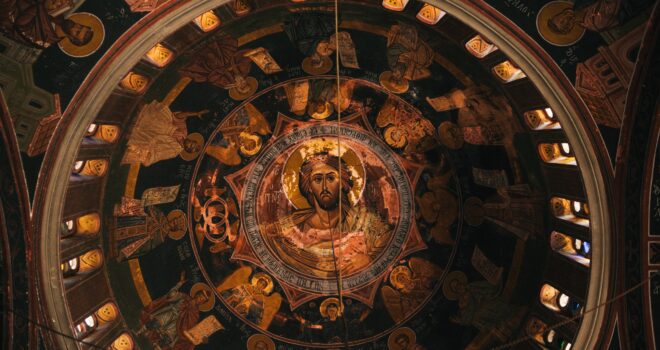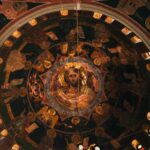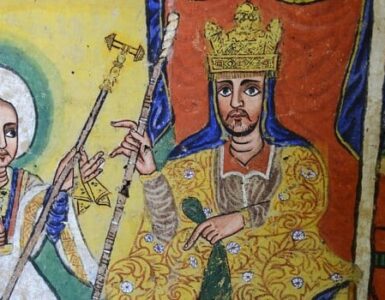29th Sunday in Ordinary Time. October 22, 2023.
Is 45:1, 4-6; 1Thes 1:1-5; Mt 22:15-21
“Repay to Caesar what belongs to Caesar and to God what belongs to God.”
In these words, Jesus gives us the blueprint for flourishing in any society.
We can easily know what rightly belongs to a society from its constitutions and laws. We give the society its due by following its legitimate laws and responsibly pursuing the common good of all in the society.
But what is it that belongs to God that we must give to Him always? Reflecting on ourselves with eyes of faith, we realize that we are created in the image and likeness of God. We belong to Him as His creatures. Likewise, we see ourselves covered in the blood of His Son, Jesus Christ, and made His beloved children in Christ, “You are not your own, you were bought with a price. So, glorify God in your body.” (1Cor 6:19-20) We thus belong to God as His creatures and His beloved children.
Thus, what we must first offer to God is the complete gift of ourselves – body, soul, mind, will, heart, etc. We can offer many things to God e.g., money, time, goods, labors, sufferings, talents, etc. But our offering to God is incomplete as long as we are not offering ourselves to Him completely. This is what belongs to Him and what He wants above all things.
We learn from St. Paul how we can actually offer ourselves to God completely. He thanked God and prayed that the Thessalonians continued to give themselves to God through the theological virtues of faith, hope, and love. “We give thanks to God always for all of you, remembering you in our prayers, unceasingly calling to mind your work of faith and labor of love and endurance in hope of our Lord Jesus Christ.”
We give ourselves to God by a life of faith in God and His words. Our “work of faith” is a life of obedience to the words of God to us. Like the Blessed Virgin Mary, we “treasure and ponder His words in our hearts,”(Lk 2:19) so that we can “hear and observe it.”(Lk 8:21) All our actions should show our faith in God, and they should also strengthen our faith in Him. We do not just follow our blind emotions or animal instincts. Neither do we act out of human respect or to conform to public opinion.
We give ourselves to God by a life of love for God and for others for God’s sake. Our “labor of love” is our striving for the greater glory of God and the good of others in all that we do. We forget ourselves and seek to please God above all and in all things. We search for His will in all things and above all things.
We give ourselves to God by a life of hope in Jesus Christ. We do not depend on ourselves or any other creature but depend on God for all our material and spiritual need. We face trails in life with certainty that God will give us all the graces that we need to be faithful to Him. We do not lose our hope in Him no matter what we experience in this life. We have that confidence that He will raise us up from the dead at the last day.
My dear brothers and sisters in Christ, in the divine plan, human societies are meant to be places of flourishing, i.e., places where we all become more of whom God is calling us to be as we seek for the common good of all. God does not will that our communities be divided and filled with so much hatred and violence. He does not will that we deny the unborn their right to life or terminate the lives of the sick and elderly. He does not will that we live depraved lives that leave us depressed and afraid. He wills that we be holy and wholesome in the societies that we find ourselves.
We and our societies are broken and hurting because we are trying to give to society what is due to it without first of all giving to God what belongs to Him. How dare we complain about the ills of society when we are not first giving ourselves to God through lives of faith, hope, and charity? We lament our corrupt and inept civil leaders, our activist judges, and unjust and immoral laws while we deny God the living faith, fervent love, and firm hope that we should give to Him.
When we begin to give ourselves to God as we should, God will use us powerfully in our society for the good of others. Remember how God used Cyrus, a pagan king, to set His people free from bondage and bring them back to their land. God equipped and used Cyrus for His purpose of restoring His people though Cyrus did not know the true and living God, “I have called you by name, giving you a title, though you knew me not…It is I who arm you, though you knew me not.” (Is 45:4,5)
If God can accomplish great things through a king who did not know Him, imagine for a moment the great good that God can do in us and through us who know and relate with Him through faith, hope, and love. Imagine how much we can contribute selflessly to the common good of society and foster the flourishing of all in our societies when we are in striving to live according to these theological virtues.
When we give ourselves to God as we should, we find that He has placed in us all that we need to the give to the society that is above and beyond paying taxes and keeping civil rules. We bring saving truth and justice to the oppressed. We bring hope and faithful witness to the Gospel. We bring an unselfish and generous spirit to the society. Imagine how this can change and transform our societies.
The Eucharist is the Mystery of faith wherein Jesus makes His own self-offering to the Father present to us in the form of bread and wine. We cannot offer ourselves to God unless we participate in Jesus’ own self-offering in the Eucharist. This is why the Eucharist is beneficial for each one of us as well as for each society. It remains the way that Jesus transforms and uses individual persons for powerful societal changes.
Let us approach each Eucharist then with the faith, hope, and charity that we received in baptism. Here we shall also find grace to practice and grow in these virtues. This is how we can give ourselves to God and become instruments for human flourishing in our societies. Indeed, this is what God wants for us and this is what we must offer to Him always.
Glory to Jesus! Honor to Mary!
Photo by Elimende Inagella on Unsplash












